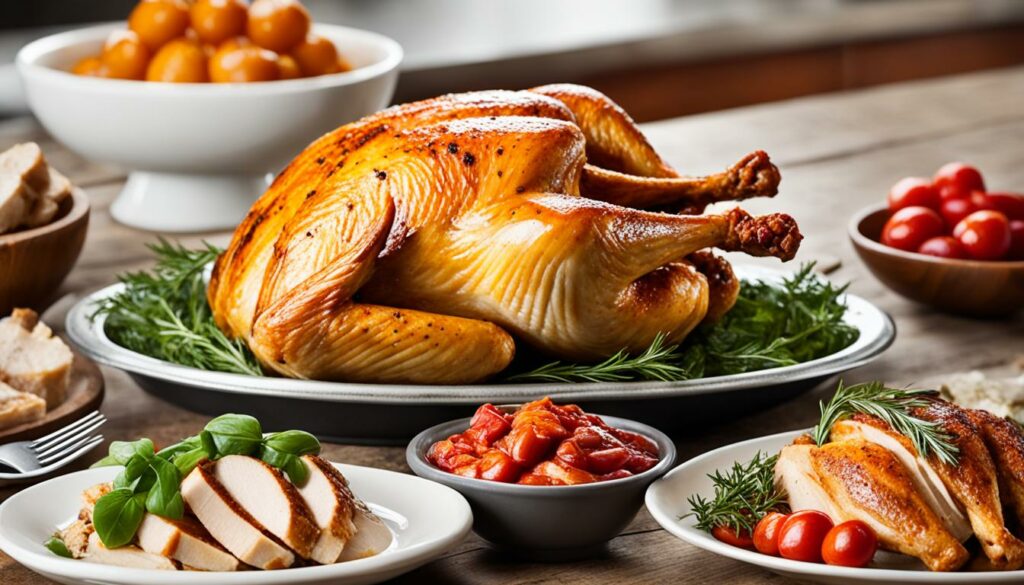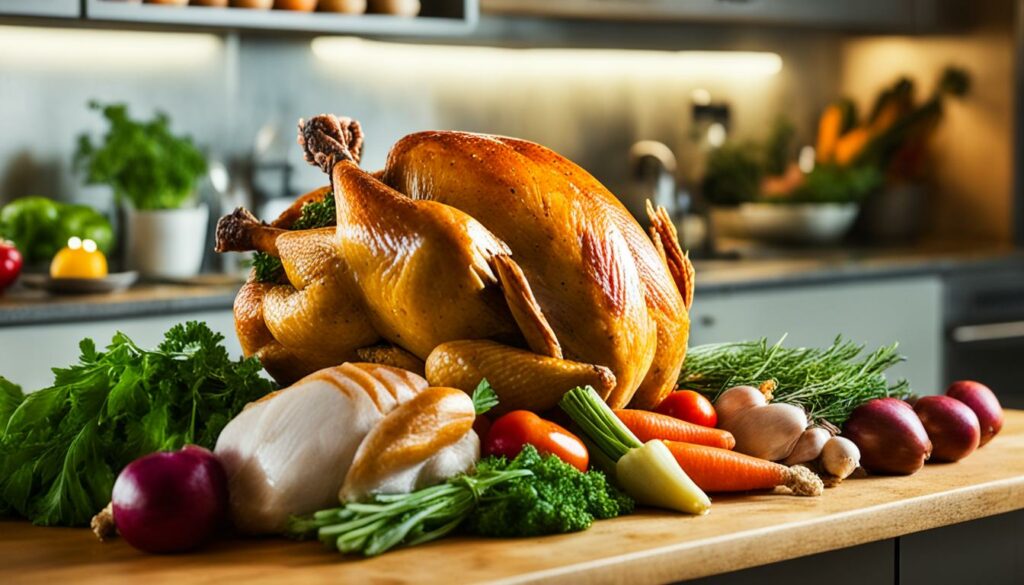Did you know that Americans consume over 50 million turkeys and 9 billion chickens each year? That’s a staggering amount of poultry on our plates! But with so many options, which is the healthier choice: turkey or chicken?
Let’s dive into the nutrition facts and health benefits of these two popular meats to find out.
Key Takeaways:
- Turkey and chicken are both healthy options, but their nutritional profiles differ slightly.
- Turkey is higher in B vitamins, iron, and selenium, while chicken is higher in phosphorus and vitamins B3 and B6.
- Both meats are lean sources of protein and can support muscle growth and repair.
- Cooking methods and portion sizes also play a role in maximizing the health benefits of turkey and chicken.
- The choice between turkey and chicken ultimately depends on personal preferences and health goals.
White Meat vs Dark Meat Chicken: Nutrition and Differences
When it comes to chicken, the color of the meat makes a difference in both nutrition and taste. Let’s explore the nutritional value and differences between white meat and dark meat chicken.
The Color and Composition of Chicken Meat
Chicken meat can be categorized into two main types: white meat and dark meat. The color variation is influenced by the type of muscle fibers and myoglobin content found in different parts of the chicken.
White Meat:
White meat is predominantly found in the breast and wing cuts of the chicken. It has a lighter color and a milder flavor compared to dark meat.
One of the key differences is its lower fat content, making it a popular choice for those seeking a lean protein source. White meat is also known for its higher protein content, making it an excellent option for supporting muscle growth and repair.
Dark Meat:
Dark meat, on the other hand, is found in the legs and thighs of the chicken. It has a darker color and a richer, more pronounced flavor. Dark meat contains a slightly higher fat content compared to white meat.
However, it also provides additional vitamins and minerals, including iron and zinc. These nutrients contribute to its unique flavor and offer additional health benefits.
Nutritional Value of White Meat vs Dark Meat Chicken
| Nutrients | White Meat | Dark Meat |
|---|---|---|
| Protein | High | Moderate |
| Fat | Low | Moderate |
| Iron | Low | Moderate |
| Zinc | Low | Moderate |
| Vitamin B12 | Low | Moderate |
Note: Nutrient values may vary depending on specific cuts of chicken and cooking methods.
Using White Meat and Dark Meat in Your Diet
Both white meat and dark meat chicken have their own nutritional benefits and can be part of a healthy diet. Consider your dietary goals and personal preferences when choosing between the two.
If you prefer leaner options and are focused on higher protein intake, white meat chicken can be a great choice. On the other hand, if you enjoy richer flavors and want to incorporate additional vitamins and minerals, dark meat chicken is a suitable option.
Remember, moderation is key. It’s essential to balance your overall diet and consider the nutrient profiles of other foods you consume to meet your specific nutritional needs.
Health Benefits of Turkey and Chicken
Turkey and chicken are not only delicious, but they also offer numerous health benefits. Both of these lean meats are excellent sources of protein, which is essential for muscle growth and repair. Protein fuels our bodies, aids in digestion, and supports a healthy immune system.
When it comes to nutritional content, turkey and chicken have some slight variations. Turkey, for instance, is higher in B vitamins like niacin, riboflavin, and pantothenic acid. It is also a rich source of iron and selenium, which are vital for energy production and immune function.
“Turkey: a powerhouse of vitamins and minerals.”
On the other hand, chicken is higher in phosphorus, an essential mineral that helps maintain the health of our bones and teeth. It is also higher in vitamins B3 and B6, which support metabolism, brain function, and the production of red blood cells.
“Chicken: packed with phosphorus and essential vitamins.”
Both turkey and chicken are low-calorie meats, making them ideal for weight management.
A serving of skinless roasted turkey breast contains approximately 135 calories, while the same portion of skinless roasted chicken breast provides around 165 calories. These lean meats can make you feel full and satisfied without adding excessive calories to your diet.
In summary, both turkey and chicken offer significant health benefits. Choosing between the two ultimately depends on personal preferences and specific health goals. Whether you opt for turkey or chicken, you can enjoy the benefits of lean protein, essential vitamins, and minerals that contribute to overall health and well-being.
| Turkey | Chicken | |
|---|---|---|
| Protein Content | 24 grams per 100 grams | 21 grams per 100 grams |
| Calories | 135 calories per 100 grams* | 165 calories per 100 grams** |
| Vitamin B3 (Niacin) | 6.36 milligrams per 100 grams | 11.15 milligrams per 100 grams |
| Vitamin B6 | 0.73 milligrams per 100 grams | 0.6 milligrams per 100 grams |
| Phosphorus | 189 milligrams per 100 grams | 228 milligrams per 100 grams |
| Iron | 1.45 milligrams per 100 grams | 0.78 milligrams per 100 grams |
| Selenium | 16.5 micrograms per 100 grams | 17.8 micrograms per 100 grams |
*Based on skinless roasted turkey breast
**Based on skinless roasted chicken breast
Culinary Uses and Preparation Tips
Both turkey and chicken are incredibly versatile meats that can be incorporated into a wide range of delicious recipes. Whether you prefer turkey or chicken, you’ll find that they can be used interchangeably in many dishes, offering a variety of flavors and textures.
Let’s explore some culinary uses and preparation tips for making the most out of these poultry options.
Diverse Recipe Options
From classic roast dinners to quick and easy meals, turkey and chicken can both shine in various culinary creations. Here are a few popular ways to enjoy them:
- Stir-fries: Sauté strips of turkey or chicken with an assortment of fresh vegetables and your favorite sauce for a flavorful and nutritious meal.
- Sandwiches and Wraps: Thinly sliced, grilled turkey or chicken makes a great protein-packed filling for sandwiches or wraps.
- Tacos: Seasoned and grilled or shredded turkey or chicken can be a tasty addition to tacos, topped with fresh salsa or guacamole.
These are just a few examples, but the possibilities are endless! Get creative in the kitchen and experiment with turkey and chicken to suit your taste preferences.
Leaner Alternative
If you’re looking for a healthier alternative to ground beef, ground turkey or ground chicken can be excellent choices. They offer similar taste and texture while being lower in fat and calories, making them ideal options for those striving for weight loss or a more heart-healthy diet.
Healthier Cooking Techniques
When cooking turkey or chicken, it’s important to adopt healthier cooking techniques to preserve their nutritional value and reduce calorie and fat content. Consider the following tips:
- Remove the skin: The skin of turkey and chicken is where most of the fat is found. By removing the skin before cooking, you can significantly reduce the overall calorie and fat content without sacrificing flavor.
- Grilling or baking: Instead of frying or breading, opt for grilling or baking methods. This allows the excess fat to drain away and keeps the meat moist and flavorful.
Benefits for Weight Loss
Both turkey and chicken can be valuable additions to a weight loss diet. They are lean sources of protein, which can help promote feelings of fullness and support muscle growth. Additionally, they are relatively low in calories and fat, making them great choices for those aiming to shed pounds.
To illustrate the nutritional comparison of turkey and chicken, here’s a table highlighting their key differences:
| Nutrient | Turkey (per 100g) | Chicken (per 100g) |
|---|---|---|
| Protein | 29g | 27g |
| Fat | 3.2g | 6g |
| Calories | 135 | 165 |

As you can see, turkey and chicken are both excellent choices for weight loss due to their high protein content and relatively low calorie and fat levels.
By incorporating turkey and chicken into a balanced diet, you can enjoy delicious meals while supporting your weight loss goals and overall health.
Considerations for Choosing Turkey or Chicken
When it comes to choosing between turkey and chicken for your healthy diet, several factors should be considered. The species, animal age, breed, living environment, and feed type can all affect the nutritional profile and overall health benefits of these poultry options. Additionally, your personal dietary preferences play an important role in deciding which meat is best for you. Here are some key considerations to keep in mind:
- Saturated Fat Content: The saturated fat content in turkey and chicken can vary depending on factors such as diet and breeding. If you are concerned about saturated fat intake, you may opt for skinless chicken breast, which is known to be relatively low in saturated fat.
- Nutritional Value: While both turkey and chicken are excellent sources of lean protein, their nutritional profiles differ slightly. Turkey is generally higher in B vitamins, iron, and selenium, while chicken tends to have higher levels of phosphorus, vitamin B3, and vitamin B6.
- Personal Dietary Goals: If you have specific health conditions or dietary goals, consulting with a dietitian can provide personalized guidance. They can help you determine which meat aligns best with your nutritional needs.
Ultimately, both turkey and chicken offer health benefits and can be part of a balanced diet. Choose based on your individual preferences, nutritional requirements, and health goals.

| Consideration | Turkey | Chicken |
|---|---|---|
| Saturated Fat Content | Varies based on cut and preparation | Varies based on cut and preparation |
| Nutritional Value | Higher in B vitamins, iron, and selenium | Higher in phosphorus, vitamin B3, and vitamin B6 |
| Personal Dietary Goals | Consult with a dietitian for personalized advice | Consult with a dietitian for personalized advice |
Cooking Tips for Healthy Meals
To prepare healthy meals with turkey and chicken, it’s important to follow some cooking tips. By using healthy cooking methods and making mindful choices, you can create nutritious and delicious dishes.
1. Choose Healthy Cooking Methods:
Opt for grilling or baking instead of frying or breading the meat. These methods reduce the calorie and fat content of the dish while retaining the natural flavors. They also help to maintain the nutritional value of the turkey and chicken.
2. Remove Excess Fat and Skin:
Take the time to trim off any visible fat and remove the skin from the turkey or chicken. This reduces the overall calorie and fat intake of the meal without sacrificing taste. Keep in mind that the skin is higher in saturated fat.
3. Select Lean Cuts:
When purchasing turkey and chicken, choose lean cuts such as boneless, skinless chicken breasts or turkey breast. These cuts are lower in fat and calories compared to dark meat or cuts with the skin on.
4. Use Healthy Oils:
When cooking, use healthy oils like olive oil or avocado oil. These oils contain healthier fats and can add flavor to your dishes. Be mindful of the amount of oil used and aim for moderation.
5. Watch Your Seasonings:
Be cautious about the amount of salt and seasoning you add to your turkey or chicken dishes. Too much salt can increase sodium intake, which may be undesirable for individuals with certain health conditions. Opt for herbs, spices, and natural flavorings to enhance the taste instead.
6. Cook at Appropriate Temperatures:
Ensure that turkey and chicken are cooked thoroughly to avoid any food safety issues. Use a food thermometer to check the internal temperature. Cooking at appropriate temperatures also minimizes the production of harmful compounds.
| Turkey (100g serving) | Chicken (100g serving) | |
|---|---|---|
| Calories | 104 | 165 |
| Total Fat (g) | 1.7 | 5.6 |
| Protein (g) | 24 | 31 |
| Iron (mg) | 1.3 | 1.1 |
Table: Nutrition Facts for Turkey and Chicken
Following these cooking tips will help you create healthy meals with turkey and chicken that are both nutritious and delicious. Whether you’re looking to lose weight or maintain a healthy lifestyle, these tips will ensure that you make the most of the nutritional value of turkey and chicken.
Conclusion: Choosing Between Turkey and Chicken
The choice between turkey and chicken ultimately depends on personal preferences, health goals, and individual dietary needs. Both meats have their own nutritional advantages and can be part of a healthy diet.
Turkey is slightly higher in some vitamins and minerals, such as B vitamins, iron, and selenium, which are essential for energy production, immune function, and antioxidant defense.
Chicken, on the other hand, is higher in phosphorus, which is important for bone health, and vitamins B3 and B6, which play a role in metabolism and brain function.
To optimize nutritional intake, it is recommended to incorporate a variety of lean protein sources into your diet, including both turkey and chicken. This ensures that you benefit from the unique nutrient profiles of each meat.
An important consideration is to cook these meats in healthy ways, such as grilling or baking, and to remove the skin and excess fat to minimize calorie and fat intake. Portion control is also crucial for maintaining a balanced diet.
By making informed choices and incorporating both turkey and chicken into your meals, you can enjoy the health benefits of these lean protein options, support muscle growth and repair, and contribute to overall health and well-being.
FAQ
Is turkey healthier than chicken?
Both turkey and chicken are healthy options and can be part of a balanced diet. The choice between the two ultimately depends on personal preferences and dietary needs.
What is the difference between white meat and dark meat chicken?
White meat, found in breast and wing cuts, is lighter in color, lower in fat, and higher in protein. Dark meat, found in legs and thighs, is darker, richer in flavor, and contains more fat but also provides additional vitamins and minerals.
Are turkey and chicken high in protein?
Yes, both turkey and chicken are lean sources of protein that can support muscle growth and repair.
What are the health benefits of turkey and chicken?
Turkey is higher in B vitamins, iron, and selenium, while chicken is higher in phosphorus and vitamins B3 and B6. Both meats are low in calories and can help with weight management.
Can turkey and chicken be used interchangeably in recipes?
Yes, turkey and chicken can be used interchangeably in various recipes like stir-fries, sandwiches, and tacos. Ground turkey and chicken can also be substituted for ground beef for a leaner option.
What factors should I consider when choosing between turkey and chicken?
Factors to consider include species, animal age, breed, living environment, feed type, and personal dietary preferences. Saturated fat content and overall nutrient profile may vary based on these factors.
How can I prepare healthy meals with turkey and chicken?
Use healthy cooking methods like grilling or baking. Remove the skin and excess fat to reduce calorie and fat intake. Choose lean cuts of meat and use healthy oils for cooking. Be mindful of added salt and seasoning.
Which is better for weight loss, turkey or chicken?
Both turkey and chicken are low in calories and can be beneficial for weight loss. It’s important to consider portion sizes and incorporate them into a balanced diet.
Is there a significant difference in nutritional value between turkey and chicken?
While there are slight variations in vitamins and minerals, both turkey and chicken offer similar nutritional value. It’s important to incorporate a variety of lean protein sources into your diet for optimal health.
Should I consult a dietitian before choosing between turkey and chicken?
It’s always a good idea to consult a dietitian, particularly if you have specific health conditions or dietary goals. They can provide personalized advice based on your individual needs.




